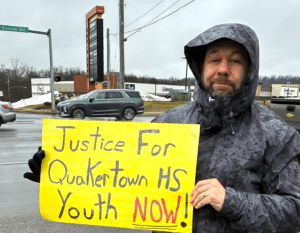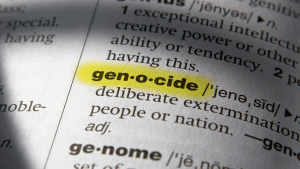Local stakeholders interested in attending the Souderton Area School District’s monthly committee or action board meetings never have to worry about crowds or finding a seat.
Overall, the meetings are poorly attended and insightful public comment is sparse, mostly because it’s hard to comment about items on a meeting agenda when there is no access to details or specifics regarding the issues the board plans to discuss.
It’s also hard to go back to and listen to prior meetings for clarity on any issue because the action meetings aren’t archived for longer than 30 days. The committee meetings aren’t recorded at all.
Alex Wisser, a local resident, parent and taxpayer in the district believes that people who do go to the meetings often depart with more questions than they had going in and that the lack of transparency invites suspicion.
“If this board and administration truly want to be good stewards of our tax dollars and support all families in the district, these are two simple actions that would go a long way to building trust in the community,” Wisser said regarding the board’s failure to provide detailed financial information and the absence of an archive for meeting videos.
After reviewing several years of meeting minutes, the Beacon discovered that no financial data is shared with the public despite being funded by taxpayers.
In addition to the financial data, the nine-member Republican school board has also chosen not to share copies of any contracts or agreements the district enters into.
At least seven school districts in relatively close proximity to the Souderton Area School District, including Boyertown, Perkiomen Valley, Quakertown, Upper Perkiomen, North Penn, and Pennridge, provide a variety of documents that offer context for committee meeting work or serve to clarify school board director votes at action meetings.
“By omitting documentation or proposed budgets and contracts it’s clear the board does not care about the input of the parents or taxpayers, nor do they intend to take our thoughts into consideration,” said Robyn Kitt, a local resident and parent.
Kitt said that if she tasked her staff with identifying an outside vendor for a specific service, she would expect to see several detailed proposals outlining the scope of work to be performed and finds it concerning that this type of information is not provided to members of the Souderton community. “How can the public be sure the district is doing the job they were appointed to do,” she asked.
Every month in school districts across Pennsylvania, school board directors approve payment of invoices billed for legal fees, art supplies, utilities, vehicle maintenance, food service and many other things needed for the district to function.
Without access to the district’s financial data, constituents have no insight as to how their tax dollars are being spent.
According to the Pennsylvania School Code, Act 14 of 1949, Article IV, Organization Meetings and Officers of Boards of School Directors, Section 443 (7), as it pertains to the board secretary, says:
“He shall keep correct accounts with each receiver of taxes, school treasurer, or school tax collector of the district, reporting a statement of the same, together with a statement of the finances of the district, at each regular meeting of the board, which statement shall be entered in full upon the minutes;”
There are no online meeting minutes for the Souderton Area School District that provide this type of financial data.
Neighboring school districts don’t provide financial documents to local stakeholders as a courtesy, they do it because it’s required by statute and because the Right-to-Know Law affords the public the ability to see how their tax dollars are being spent.
The Beacon reached out to Board President Ken Keith to inquire why these documents aren’t available, but Keith did not respond.
Board Docs, a school board management software accessible via the district’s website, has the ability to easily incorporate documents into upcoming meeting agendas but it does not appear that the district makes use of this convenient feature.
“The information, such as financial attachments, should be accessible to residents of the district,” said Wisser, who added that neighboring districts provide this information without phone calls or Right-to-Know requests.
“Even the previous Pennridge school board majority included financial records at every school board meeting,” she added, referring to the Republican stronghold in Pennridge prior to November’s election when Democrats flipped the board.
In addition to the absence of monthly financial data, Souderton also receives a failing grade for its lack of transparency when it comes to the availability of contracts, agreements, and district policies that are not made available to the public.
Without access to meeting-related documents, the community is at a great disadvantage and prevented from fully comprehending the ramifications of any vote, including for policies that are new or are being revised.
Customarily, all school policies are first discussed at committee meetings prior to being presented at an action board meeting for a first, second or third reading followed by final approval for implementation. If revisions are required prior to final approval, the policy is returned to the committee for additional revision.
School board committee meetings are just as important as action meetings because it’s where the work gets done.
A review of Souderton committee meeting minutes for the last year contains only one reference to the Policy Committee having met. In April Policies 137 – 137.3, pertaining to home education, were introduced for adoption.
Policy 140, another new policy concerning the Souderton Charter School Collaborative, was on the March monthly action meeting agenda for a first read, however this is problematic because according to meeting minutes, Policy 140 was never reviewed or discussed by the Policy Committee.
Further complicating this matter are the minutes from the March action meeting.
“District Solicitor Mr. Sultanik highlighted the content of Policy 140 which is developed by the PA School Boards Association of which the school district is a subscriber. Mr. Sultanik confirmed that modifications have been made to the existing policy.”
Except Policy 140 was not an existing policy, at least according to the information available on the district’s website via Board Docs.
Aside from April, there are no other Policy Committee meeting references during 2023.
Souderton Area For Responsible Leadership (SAFRL) noted that over the last seven years, “48 new or revised policies have been approved, despite the Policy Committee having had no public meetings regarding them.”
“These policies pertain to child abuse, sexual harassment, bullying, and cyberbullying, among other topics,” according to SAFRL, who also noted that SASD Policy 003 provides for three public readings.
Omitting public review of policies is a violation of Pennsylvania’s Sunshine Act.
Souderton also misses the bar by failing to livestream their meetings. The action meetings, not committee meetings, are recorded and placed online after the meeting but only remain available for 30 days.
Souderton has the ability and technology to stream their meetings as demonstrated during the Covid pandemic.
The elected board has chosen not to make meetings easily accessible. Other local school districts live stream meetings and maintain an archive of videos so that anyone at any time can go back and review what was said or done.
One parent, who talked with the Beacon under the condition of anonymity, said they believe these infractions occur because no one says anything or complains.
“The way they’re looking at it is the more information we put out there, the more potential pushback we’re going to have, so we’re going to put out as little as we possibly can until somebody forces the issue because it’s less likely that we’re going to have any sort of issue, for lack of a better term,” they said.
“And it’s worked for them for however many years.”






